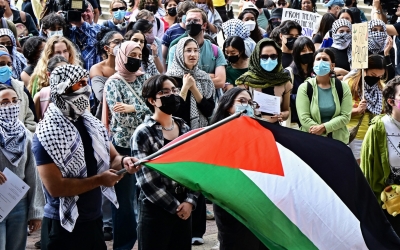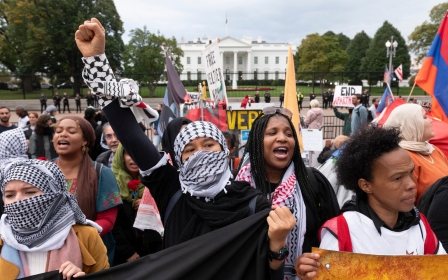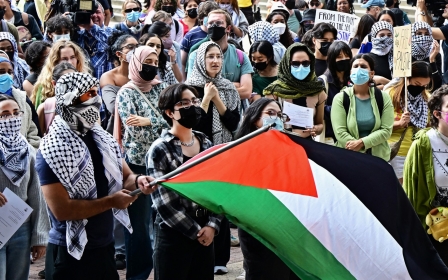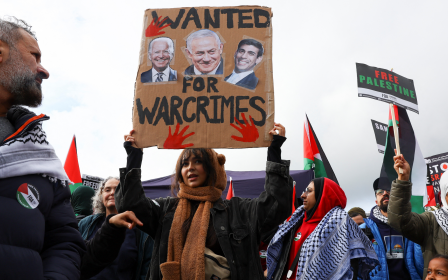Israel-Palestine war: The 'war on terror' continues to target pro-Palestine activists
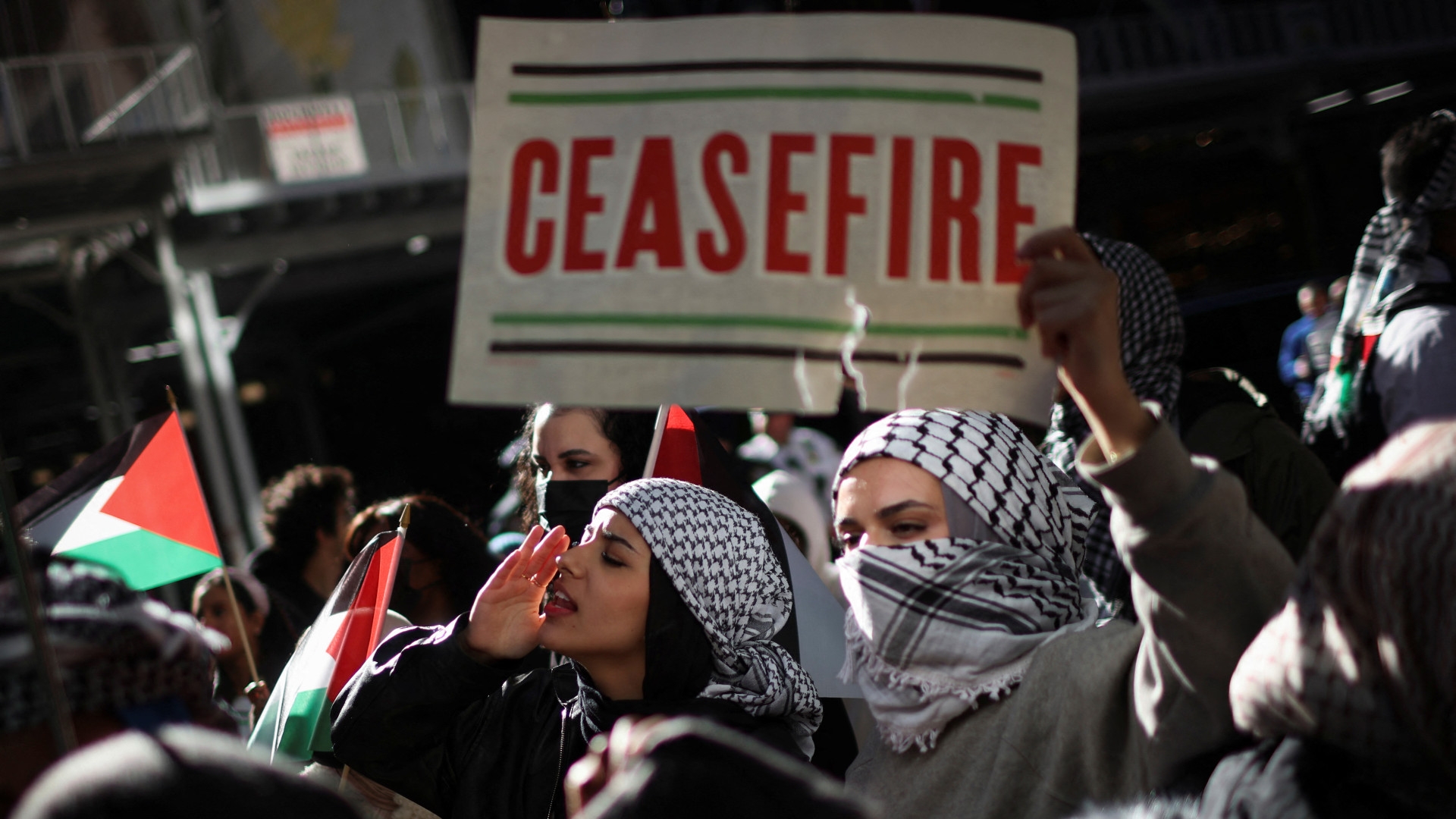
Over the past few weeks, the world has witnessed Israel commit genocide and ethnic cleansing in Palestine. Israel’s war crimes in Gaza, including indiscriminate bombing of civilian targets, chemical warfare and shutting off access to power, have resulted in thousands of deaths.
The genocide has been further fuelled by the White House and US President Joe Biden, who requested from Congress an "unprecedented" defence and financial aid package for Israel on top of the $3.8bn in annual military aid that the US already provides to Israel.
Amid statements from US officials, including Biden himself, who stated that the 7 October attacks were like "15 9/11s" for Israel, it is impossible not to see the connections between the current crackdown on Palestinian and Muslim advocates and the US “war on terror”.
Of course, the targeting and surveillance of Muslim, Arab, and Palestinian communities did not begin after 9/11: a 2021 Project South report, "Spying on the Margins", documented the history of US racist and Islamophobic surveillance stretching back to the colonial period.
Over the last 20 years, national security frameworks have proliferated the use of surveillance while repressing dissent. This expanding apparatus has been weaponised against organisers for years. So, it is no surprise that the FBI and other agencies are once again targeting voices who speak in support of Palestine.
Criminalising dissent
After 9/11, the government instituted policies of mass surveillance and eroded civil liberties. Muslim, Middle Eastern, and South Asian communities were subjected to numerous human rights violations, including discriminatory profiling and surveillance based on their identity.
There was also an increase in the use of preemptive prosecution, which was used to criminalise people of colour, particularly Muslims and immigrants. Recently, FBI Director Christopher Wray stated there are multiple open investigations, signalling further preemptive prosecution and entrapment cases targeting Muslim communities.
This model of intense governmental overreach, which continues today, was perfected over the last 20 years and continues to threaten Palestinian, Arab, and Muslim communities. Unlike the early 2000s, however, the government now has access to vast amounts of data, through surveillance technology and data brokers that can be, and has been, weaponised against entire groups or movements, such as the Black Lives Matter movement.
Florida Governor Ron DeSantis has banned chapters of Students for Justice in Palestine, a pro-Palestine student group, from all state university campuses in Florida, putting forward the blatantly false claim that the group supports terrorism.
Follow Middle East Eye's live coverage for the latest on the Israel-Palestine war
Former President Trump even suggested that supporters of Palestine should be banned from universities. On 26 October the US Senate unanimously passed a resolution denouncing pro-Palestine student groups, falsely labelling them as antisemitic.
The White House has only added to the suppression of Palestinian and pro-Palestine voices. On 30 October, the press secretary compared pro-Palestine activists to white supremacists who marched in Charlottesville. A few weeks before, Biden announced in a 10 October tweet that “local and federal law enforcement partners are closely monitoring for any domestic threats,” though the Department of Homeland Security noted that they did not have any specific credible information of any threat.
The US criminal legal system uses the term 'terrorist' to intimidate and indict US organisers
Numerous groups, such as the Arab American Anti-Discrimination Committee, have reported an increase in FBI contacts and mosque visits throughout the US.
Attorneys have also reported concerning and unusual ICE attention on Palestinian immigrants - a departure from normal ICE policing patterns. Eric London, an immigration attorney, reported that one of his clients was detained and interviewed without access to counsel for five days, despite his attempts to get in contact with them.
At the same time, numerous Republicans have called for international students who are deemed “supportive of Hamas” to be deported. It is not clear who the arbiter of this characterisation would be and what criteria would be used to define someone as a “supporter of Hamas”. Conceivably, anyone who supports Palestinian self-determination could be targeted.
Even the current framing of Palestinian resistance as “terrorism” can be linked to the “war on terror”, which has justified Islamophobia, xenophobia, and anti-Blackness worldwide. Israel’s military threatened residents in Gaza that they would be considered accomplices to terrorism if they did not leave their homes and flee the northern part of the Gaza Strip.
The message is evidence of Israel’s intent to forcibly displace Palestinian residents, while weaponising the language of national security against those who refuse to surrender their homes for Israeli occupation.
Repressing dissent, which extends beyond borders, has a ripple effect across all movements. The US criminal legal system uses the term “terrorist” to intimidate and indict US organisers working to end law enforcement exchange programmes with Israel and stop “Cop City”, the planned Atlanta training centre for police aimed at honing tactics of repression.
On 25 October, ADL and Brandeis Center sent a letter to presidents of colleges and universities urging them to investigate Students for Justice in Palestine chapters, under the federal statutes - 18 USC 2339A and B - criminalising material support for foreign terrorist organisations (“FTO”), and its state equivalents. Actions in support of Palestinian human rights have often been construed by the US government as “material support or resources” to an FTO.
The letter is particularly concerning as Terry Albury, an FBI counterterrorism special agent turned whistleblower, has stated that when the ADL talks, the FBI listens. While campuses themselves likely lack resources to investigate students for material support charges, there is a concerning likelihood that campus police will coordinate with Joint Terrorism Task Forces to target Palestinian students.
The risk that students will be targeted for speaking out in support of Palestine is further heightened as just this week, President Biden announced a new initiative to combat antisemitism. Under the initiative, DHS will send cybersecurity experts to schools - a move that has the potential to result in prosecutions, such as those for material support of terrorism, particularly given the recent conflation of antisemitism and anti-Zionism.
The Virginia attorney general’s office also announced this week its investigation into the non-profit, American Muslims for Palestine (AMP), over allegations of using funds to “support or benefit terrorism”. This move is reminiscent of the post-9/11 targeting of Muslim charities and institutions for investigation and prosecution based on alleged ties to designated FTOs, no matter how outlandish the charges.
For example, the five Palestinian American leaders of the Holy Land Foundation (HLF), at the time the largest Muslim charity in the US, were prosecuted in 2008 under 2339B. They were accused of providing humanitarian aid to zakat (charity) committees in the Israeli-occupied Palestinian territories.
Prosecutors argued that the zakat committees were run by Hamas, a designated FTO, though the US government provided aid through the same committees and continued to do so after the HLF prosecution.
Suppressing speech
Social media and tech companies have also played a role in the current backlash against Palestinian and pro-Palestine voices, from shadow banning and suspending accounts, to censoring images of bombings in Gaza, to removing content for alleged terms of service violations.
Numerous civil society organisations issued a letter to tech companies, drawing attention to the censorship of Palestinian voices and urging companies to refrain from silencing Palestinian voices. Such tech policing is not new. Social media and tech companies such as Meta’s Instagram and Facebook have suppressed speech related to Palestine, and Google has silenced and retaliated against employees who criticised its work with the Israeli military in the past.
Companies have also acted swiftly to condemn anyone who supports Palestine or condemns Israel’s actions. Starbucks sued the Starbucks Workers United union for trademark infringement after it made a pro-Palestine social media post.
The Hilton Hotel in Houston, Texas, cancelled a conference organised by the US Campaign for Palestinian Rights (USCPR), citing “security concerns”. Governor Greg Abbott applauded the decision, which the USCPR described as a clear “act of ethnic, racial and religious discrimination.”
The Hyatt Regency hotel in Chicago, which for years hosted the annual AMP convention during Thanksgiving weekend, subsequently announced its cancellation.
In academia and private employment, speaking up in favour of Palestinian human rights has triggered consequences such as losing jobs or job offers. A New York University School of Law student, Ryna Workman, who spoke out had their job offer to US law firm Winston & Strawn publicly revoked. The administration further issued a statement - and even doubled down - condemning Workman and providing no protection after they faced harassment.
Matthew Solomson, a federal judge, announced a refusal to hire anyone who supports Palestine.
Following a pro-Palestine letter signed by a number of organisations at Harvard University, some CEOs and employers announced a refusal to hire anyone who had signed on to or belonged to an organisation that supported the statements denouncing the Israeli occupation. A truck circled the campus publicising the names and pictures of individuals in the supporting organisations. At Yale, a petition was circulated calling for the dismissal of Professor Zareena Grewal for social media posts in support of Palestine.
Such condemnation is also not new. Earlier this year, Fatima Mohammed, a graduating law student at the City University of New York (CUNY), faced a significant backlash for her commencement speech condemning Israel’s human rights violations against Palestinians. The CUNY Board of Trustees even condemned the speech as hate speech.
The current environment of repression, harassment, and heightened government surveillance facing Muslims is directly related to harmful practices entrenched in the 'war on terror'
Palestinians have the undeniable right to self-determination. Yet, people speaking out in support of Palestinian liberation or condemning Israel’s apartheid have faced intense and widespread backlash.
The current environment of repression, coordinated harassment, and heightened government surveillance facing Muslims and Palestinians is directly related to harmful practices entrenched in the “war on terror”.
Instead of arming and funding Israel in its ongoing genocide and military occupation of Palestine, the US must call for an end to the Israeli occupation of Palestinian land and an end to the system of apartheid and settler colonialism.
The US must stop funding the Israeli military apparatus that is currently bombing Gaza at a genocidal rate, including targeting hospitals, churches, and other sites of refuge for displaced Palestinians.
The US government and its allies in the West must also cease repressive practices that target Black, Muslim, and immigrant organisers who speak out in support of Palestinian liberation.
The views expressed in this article belong to the author and do not necessarily reflect the editorial policy of Middle East Eye.
This article is available in French on Middle East Eye French edition.
Middle East Eye propose une couverture et une analyse indépendantes et incomparables du Moyen-Orient, de l’Afrique du Nord et d’autres régions du monde. Pour en savoir plus sur la reprise de ce contenu et les frais qui s’appliquent, veuillez remplir ce formulaire [en anglais]. Pour en savoir plus sur MEE, cliquez ici [en anglais].


